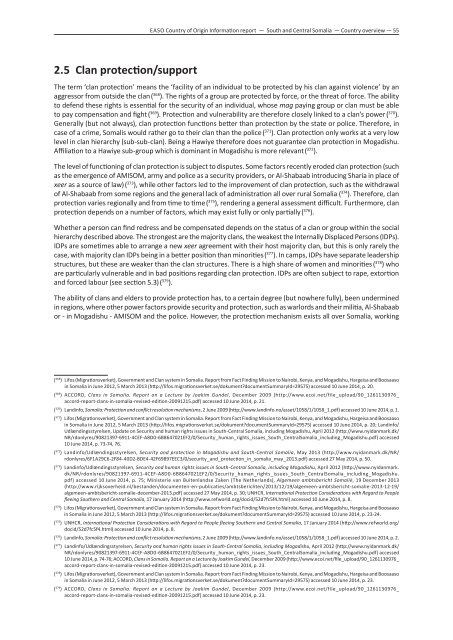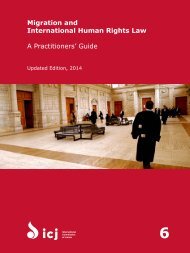Create successful ePaper yourself
Turn your PDF publications into a flip-book with our unique Google optimized e-Paper software.
EASO Country of Origin Information report — South and Central <strong>Somalia</strong> — Country overview — 55<br />
2.5 Clan protection/support<br />
The term ‘clan protection’ means the ‘facility of an individual to be protected by his clan against violence’ by an<br />
aggressor from outside the clan ( 368 ). The rights of a group are protected by force, or the threat of force. The ability<br />
to defend these rights is essential for the security of an individual, whose mag paying group or clan must be able<br />
to pay compensation and fight ( 369 ). Protection and vulnerability are therefore closely linked to a clan’s power ( 370 ).<br />
Generally (but not always), clan protection functions better than protection by the state or police. Therefore, in<br />
case of a crime, Somalis would rather go to their clan than the police ( 371 ). Clan protection only works at a very low<br />
level in clan hierarchy (sub‐sub‐clan). Being a Hawiye therefore does not guarantee clan protection in Mogadishu.<br />
Affiliation to a Hawiye sub‐group which is dominant in Mogadishu is more relevant ( 372 ).<br />
The level of functioning of clan protection is subject to disputes. Some factors recently eroded clan protection (such<br />
as the emergence of AMISOM, army and police as a security providers, or Al‐Shabaab introducing Sharia in place of<br />
xeer as a source of law) ( 373 ), while other factors led to the improvement of clan protection, such as the withdrawal<br />
of Al‐Shabaab from some regions and the general lack of administration all over rural <strong>Somalia</strong> ( 374 ). Therefore, clan<br />
protection varies regionally and from time to time ( 375 ), rendering a general assessment difficult. Furthermore, clan<br />
protection depends on a number of factors, which may exist fully or only partially ( 376 ).<br />
Whether a person can find redress and be compensated depends on the status of a clan or group within the social<br />
hierarchy described above. The strongest are the majority clans, the weakest the Internally Displaced Persons (IDPs).<br />
IDPs are sometimes able to arrange a new xeer agreement with their host majority clan, but this is only rarely the<br />
case, with majority clan IDPs being in a better position than minorities ( 377 ). In camps, IDPs have separate leadership<br />
structures, but these are weaker than the clan structures. There is a high share of women and minorities ( 378 ) who<br />
are particularly vulnerable and in bad positions regarding clan protection. IDPs are often subject to rape, extortion<br />
and forced labour (see section 5.3) ( 379 ).<br />
The ability of clans and elders to provide protection has, to a certain degree (but nowhere fully), been undermined<br />
in regions, where other power factors provide security and protection, such as warlords and their militia, Al‐Shabaab<br />
or - in Mogadishu - AMISOM and the police. However, the protection mechanism exists all over <strong>Somalia</strong>, working<br />
( 368 ) Lifos (Migrationsverket), Government and Clan system in <strong>Somalia</strong>. <strong>Report</strong> from Fact Finding Mission to Nairobi, Kenya, and Mogadishu, Hargeisa and Boosaaso<br />
in <strong>Somalia</strong> in June 2012, 5 March 2013 (http://lifos.migrationsverket.se/dokumentdocumentSummaryId=29575) accessed 10 June 2014, p. 20.<br />
( 369 ) ACCORD, Clans in <strong>Somalia</strong>. <strong>Report</strong> on a Lecture by Joakim Gundel, December 2009 (http://www.ecoi.net/file_upload/90_1261130976_<br />
accord‐report‐clans‐in‐somalia‐revised‐edition-20091215.pdf) accessed 10 June 2014, p. 21.<br />
( 370 ) Landinfo, <strong>Somalia</strong>: Protection and conflict resolution mechanisms, 2 June 2009 (http://www.landinfo.no/asset/1058/1/1058_1.pdf) accessed 10 June 2014, p. 1.<br />
( 371 ) Lifos (Migrationsverket), Government and Clan system in <strong>Somalia</strong>. <strong>Report</strong> from Fact Finding Mission to Nairobi, Kenya, and Mogadishu, Hargeisa and Boosaaso<br />
in <strong>Somalia</strong> in June 2012, 5 March 2013 (http://lifos.migrationsverket.se/dokumentdocumentSummaryId=29575) accessed 10 June 2014, p. 20; Landinfo/<br />
Udlændingsstyrelsen, Update on Security and human rights issues in South‐Central <strong>Somalia</strong>, including Mogadishu, April 2012 (http://www.nyidanmark.dk/<br />
NR/rdonlyres/90821397-6911-4CEF‐A8D0-6B8647021EF2/0/Security_human_rights_issues_South_Central<strong>Somalia</strong>_including_Mogadishu.pdf) accessed<br />
10 June 2014, p. 73-74, 76.<br />
( 372 ) Landinfo/Udlændingsstyrelsen, Security and protection in Mogadishu and South‐Central <strong>Somalia</strong>, May 2013 (http://www.nyidanmark.dk/NR/<br />
rdonlyres/6F1A29C6-2F84-40D2-BDE4-42F69897EEC3/0/security_and_protection_in_somalia_may_2013.pdf) accessed 27 May 2014, p. 50.<br />
( 373 ) Landinfo/Udlændingsstyrelsen, Security and human rights issues in South‐Central <strong>Somalia</strong>, including Mogadishu, April 2012 (http://www.nyidanmark.<br />
dk/NR/rdonlyres/90821397-6911-4CEF‐A8D0-6B8647021EF2/0/Security_human_rights_issues_South_Central<strong>Somalia</strong>_including_Mogadishu.<br />
pdf) accessed 10 June 2014, p. 75; Ministerie van Buitenlandse Zaken (The Netherlands), Algemeen ambtsbericht Somalië, 19 December 2013<br />
(http://www.rijksoverheid.nl/bestanden/documenten‐en‐publicaties/ambtsberichten/2013/12/19/algemeen‐ambtsbericht‐somalie-2013-12-19/<br />
algemeen‐ambtsbericht‐somalie‐december-2013.pdf) accessed 27 May 2014, p. 30; UNHCR, International Protection Considerations with Regard to People<br />
fleeing Southern and Central <strong>Somalia</strong>, 17 January 2014 (http://www.refworld.org/docid/52d7fc5f4.html) accessed 10 June 2014, p. 8.<br />
( 374 ) Lifos (Migrationsverket), Government and Clan system in <strong>Somalia</strong>. <strong>Report</strong> from Fact Finding Mission to Nairobi, Kenya, and Mogadishu, Hargeisa and Boosaaso<br />
in <strong>Somalia</strong> in June 2012, 5 March 2013 (http://lifos.migrationsverket.se/dokumentdocumentSummaryId=29575) accessed 10 June 2014, p. 23-24.<br />
( 375 ) UNHCR, International Protection Considerations with Regard to People fleeing Southern and Central <strong>Somalia</strong>, 17 January 2014 (http://www.refworld.org/<br />
docid/52d7fc5f4.html) accessed 10 June 2014, p. 8.<br />
( 376 ) Landinfo, <strong>Somalia</strong>: Protection and conflict resolution mechanisms, 2 June 2009 (http://www.landinfo.no/asset/1058/1/1058_1.pdf) accessed 10 June 2014, p. 2.<br />
( 377 ) Landinfo/Udlændingsstyrelsen, Security and human rights issues in South‐Central <strong>Somalia</strong>, including Mogadishu, April 2012 (http://www.nyidanmark.dk/<br />
NR/rdonlyres/90821397-6911-4CEF‐A8D0-6B8647021EF2/0/Security_human_rights_issues_South_Central<strong>Somalia</strong>_including_Mogadishu.pdf) accessed<br />
10 June 2014, p. 74-76; ACCORD, Clans in <strong>Somalia</strong>. <strong>Report</strong> on a Lecture by Joakim Gundel, December 2009 (http://www.ecoi.net/file_upload/90_1261130976_<br />
accord‐report‐clans‐in‐somalia‐revised‐edition-20091215.pdf) accessed 10 June 2014, p. 23.<br />
( 378 ) Lifos (Migrationsverket), Government and Clan system in <strong>Somalia</strong>. <strong>Report</strong> from Fact Finding Mission to Nairobi, Kenya, and Mogadishu, Hargeisa and Boosaaso<br />
in <strong>Somalia</strong> in June 2012, 5 March 2013 (http://lifos.migrationsverket.se/dokumentdocumentSummaryId=29575) accessed 10 June 2014, p. 23.<br />
( 379 ) ACCORD, Clans in <strong>Somalia</strong>. <strong>Report</strong> on a Lecture by Joakim Gundel, December 2009 (http://www.ecoi.net/file_upload/90_1261130976_<br />
accord‐report‐clans‐in‐somalia‐revised‐edition-20091215.pdf) accessed 10 June 2014, p. 23.



